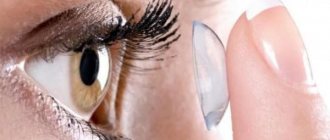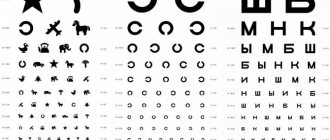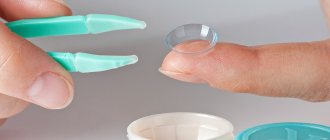Lenses have long been an alternative to glasses, which many people suffering from vision problems were forced to give up - glasses are completely incompatible with an active lifestyle, and not everyone wants to look like a “bespectacled person.” And, it seems, contact lenses are the ideal modern solution to the problem. Read: how to choose contact lenses correctly. But is this really so? What is really better - glasses or contacts?
Disadvantages of glasses
- The need to constantly carry them with you or on yourself.
- Side effects from choosing the wrong glasses, including fainting.
- Distortion of vision when wearing them.
- Limitation of lateral vision due to the temples.
- The risk of breaking or losing glasses at the moment when you need them most.
- Changes in appearance.
- Reflection of light.
- Fogging due to temperature changes.
- There is a problem with buying glasses if the difference in eye vision is greater than 2.0 D.
- High cost, subject to high-quality and beautiful frames.
Who gets to decide?
Article on the topic Looking through lenses.
How not to harm your eyes? Skeptical parents always have excuses ready for their child: “You don’t need lenses, because glasses do the job just fine,” “You’re not old enough to wear lenses,” “You won’t be able to properly care for them”... Interesting results were shown by a study conducted in Britain among parents whose children need vision correction and the children themselves. Almost half of children who wear glasses (44%) would like to give them up and have asked their parents to choose contact lenses for them, but these requests have not found understanding among adults.
The survey involved 507 parents, almost all (99%) were mothers, and 507 children, more than half (56%) were girls. Experts have concluded that one of the most important criteria when choosing a method of vision correction for a child should be the impact of this method on his self-esteem. When choosing between glasses and contact lenses for their son or daughter, parents must take into account the opinion of their child, because it is up to him to wear glasses or contact lenses and it is up to him to decide what is convenient, practical and harmless. The last word is the key one in this series: the teenage psyche is very vulnerable and sensitive, and no one will deny the fact that the self-esteem of most young bespectacled people suffers greatly. Not every child is able to adequately accept the news that he must now wear glasses, and no reasonable arguments from adults work here. Resentment due to nicknames and ridicule, embarrassment among peers due to the fact that you are not like everyone else, inconvenience when playing sports - all this is well known to those who started wearing glasses at school.
Night lenses and eye exercises. How to support a schoolchild's vision
More details
Benefits of contact lenses
- Natural vision correction is the movement of the lens following the movement of your pupil.
- No visual distortion - no reduction in view, change in size, etc.
- Comfortable to wear.
- Opportunity to engage in active sports.
- No dependence on weather conditions - rain is not a hindrance to lenses.
- Aesthetics. The opportunity not only to give up glasses that don’t suit you at all, but to “correct” your eye color thanks to colored lenses.
- Better compliance with medical requirements for visual impairments. That is, the possibility of wearing them with a difference in vision of more than 2.0 D, etc.
Opinions differ
As a result of the survey, 70% of girls and 50% of boys said that it was important for them to feel confident and comfortable when communicating with their peers. Parents, as their answers showed, also understand the importance of this factor in the lives of children, but do not go further than theory. Parents and children differed in their views on contact lens wearing: four out of ten children surveyed asked to be allowed to wear contact lenses, but most parents said no. The main parental fears are that the child will not be able to care for the lenses, install and remove them independently, and therefore risks getting an infection in the eyes (although one-day soft lenses have long been invented for this case). Many parents do not know that children are allowed to wear contact lenses from the age of eight, British doctors say. Most mothers believe that the minimum age to start using lenses is 14 years old.
Article on the topic
Who has four eyes? In what cases are lenses more convenient than glasses?
Disadvantages of contact lenses
- It is not recommended to take a shower (bath) in them. Lime deposits in running hard water are an ideal environment for microbes, so it is best to avoid getting tap water on the surface of the lenses.
- Risk of damage to the upper layer of the cornea, including loss of vision.
- The development of inflammatory processes and erosions, the risk of infection against their background - with constant wearing (for example, during working hours, throughout the week).
- Not recommended for children under 12 years of age.
- Risk of allergic reaction from lens solution.
- Reduced free access of air to the eyes.
- Not recommended when in an atmosphere saturated with chemicals and dust.
- More difficult to care for and use than glasses.
- High cost compared to glasses (laser vision correction is more practical).
Lens coating
To improve the performance properties of the lens, additional coatings are applied to it. You can save a lot of money on them by sacrificing comfort and convenience. For example, if you don’t work at a computer wearing glasses, then you don’t need screen radiation protection, but it costs about 2,000 rubles.
If you are not afraid of the sun and rain, then you can sacrifice the anti-reflective and water-repellent coating, saving a couple of thousand rubles. In the case of coating, you should focus only on your own preferences.
Are there any contraindications for contact lenses? Cases when the choice is only up to the glasses
The list of contraindications to wearing lenses includes almost all eye diseases that affect the conjunctiva and cornea.
- Inflammatory diseases of the cornea/conjunctiva/eyelids.
- Blepharitis.
- Inflammation of the cornea.
- Conjunctivitis.
- Ptosis.
- Low sensitivity of the cornea.
- Xerophthalmia.
- Glaucoma.
- Asthma.
- Lens subluxation.
- Inflammations, infections, allergic processes of the eyes.
- Dacryocyst.
- Strabismus at an angle greater than 15 degrees.
- Hay fever.
- Decreased/increased tear production.
- Certain types of professional activities.
- Chronical bronchitis.
- Tuberculosis and AIDS.
- Rhinitis.
It should be remembered that in case of any colds/viral diseases and inflammatory processes of the eyes, wearing lenses is strictly prohibited . During this period, it is better to use glasses.
What to choose - glasses or contacts?
When choosing correction means, you need to consider the following factors:
- Age. Until the age of 7-8 years, it is better for a child to wear glasses. After he goes to school, you can switch him to contact lenses. The student can handle them independently, that is, put them on, take them off and handle them.
- Lifestyle. Athletes and outdoor enthusiasts should choose lenses. They are much more convenient and safer. The same advice can be given to representatives of certain professions - drivers, firefighters, military personnel, etc.
- Health status. Medical indications are the main factor determining the method of correction. If there are contraindications to lenses, glasses are prescribed - and vice versa. If there are no restrictions, then a person has the right to decide for himself what is better for him - lenses or glasses.
- Financial opportunities. If you want to save money, it is better to buy glasses. They can last for several years or even a lifetime. However, not everyone recommends saving on vision. Choose a correction method that will be convenient and safe for you.
Regardless of what you plan to choose, contact lenses or glasses, you need to go to an ophthalmologist and undergo an examination. The optics must meet all parameters. However, they differ between spectacle and contact lenses. You cannot purchase contact correction products with a glasses prescription. If you are planning to switch to contact lenses, visit your doctor.
During the examination, it may turn out that both of the presented correction methods are not suitable for you. In such cases, laser surgery may be prescribed. In case of intolerance to optical products, it is also carried out in childhood. In some cases, on the contrary, glasses and lenses become the only possible ways to improve vision. This happens when there are contraindications to laser and surgical treatment.
Pros of lenses
Lenses are a much more modern, functional solution to the problem of poor vision. Active youth deservedly like it much more. When wearing glasses, young people often develop an inferiority complex and lack of self-confidence. Lenses in this case are much better. By changing the color of the lenses, you can make your image brighter and your eyes more beautiful. That is, the appearance not only will not deteriorate, but will be adjusted at the request of the owner. Lenses help hide features of the eyes that worsen your appearance. For example, albinism, different colors of the iris. Not to mention cases where there are scars or sores. Another undeniable advantage is that the lenses follow the movement of the pupil. This ensures natural optimization without creating vagueness. With an active lifestyle, lenses can be worn continuously for up to twelve hours. This is the most optimal duration for a man.
Other obvious advantages of the contact correction option:
- you will see clearly even with precipitation and temperature changes;
- wearing lenses, you can engage in physical exercise and even professional sports without any problems;
- even with anisometropia exceeding 2 diopters, vision will not only not deteriorate, but will also be corrected;
- You can combine all kinds of sunglasses with lenses;
- disposable lenses do not inflame your vision and are easier to care for (throw away the lenses at the end of the day and take a new pair in the morning).
Cons of lenses
The disadvantages are also obvious:
- lenses should be removed before going to bed, put on in the morning next to the mirror in bright light, while being careful and keeping clean; there are entire separate articles devoted to this;
- There are still some restrictions when using water procedures - lenses can be damaged by excess water;
- If you use lenses carelessly, you can damage your eyes, including complete loss of vision;
- wearing lenses every day, especially if you neglect cleanliness, leads to ulcers on the cornea and other inflammations;
- even if you use lenses absolutely correctly, they still to some extent limit the access of oxygen to the eyes, so it is necessary to remove them periodically, not only at night (glasses are also often removed, but this is relatively not a problem, since it is much easier);
- although they are removed less often, the lenses are much easier to lose or damage, so it is always worth having spare ones;
- lenses need to be updated from time to time and are quite expensive;
- Some people are allergic to lens solution;
- Once every three months it is strongly recommended to check with a doctor to make sure that there are no health problems.
What is better anyway?
The question of what the patient himself likes is not the most important thing here. The decision is made after consultation with an ophthalmologist. The doctor must take into account the following:
- age - when a child is under 12 years old, he cannot wear lenses, and for older people they are often also contraindicated or at least not recommended. An exception occurs only when glasses have proven ineffective and the need for lenses is high, but careful monitoring will be required;
- where a person works - at chemical plants and dusty industries, glasses would be better, and lenses would be better for doctors, athletes, builders;
- general health – if a person has difficulties with the psyche and coordination of movements, contact lenses will not be suitable in any case;
- driving – if a person drives for a long time, then ophthalmologists advise purchasing soft contact lenses for greater clarity of vision even at night and comfort.
Also, the doctor always advises to have glasses just in case. Sometimes lenses are temporarily completely contraindicated. For example, in case of viral-bacterial colds, the need to take certain medications.
You should not use lenses while taking medications against motion sickness or dizziness. After therapy, you need to check with a doctor again and if he says it’s possible, then it’s possible.
How to choose
Lenses simply cannot be used often. For example, with the following diseases and conditions of the eye:
- lens pathology;
- dacryocystitis;
- glaucoma;
- slight sensitivity of the eye shell;
- inflammation and allergies of the eyelids;
- strabismus.
If a person is seriously chronically ill, it is necessary to tell the doctor all the details and only then make a decision. A consultation with a therapist and his conclusion regarding the presence of the following diseases is required:
- immunodeficiency;
- allergic rhinitis;
- bronchial asthma;
- tuberculosis;
- oncological neoplasms;
- chronic respiratory diseases.
If at least one of them occurs, the lenses cannot be used.










